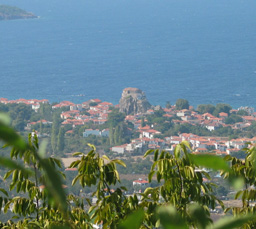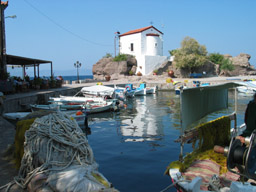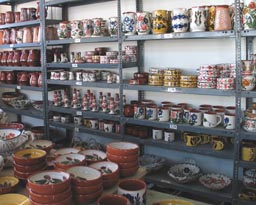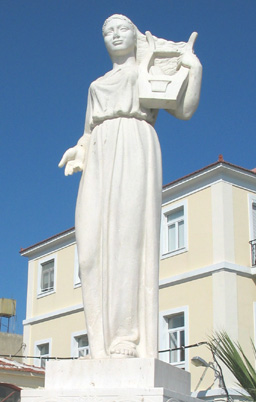|

Petra from Petri

Skala Sikaminia
 Traditional Pottery, Mandamados
Traditional Pottery, Mandamados

Statue of Sappho, Mytilini
|
Lesvos (Lesbos)
is the third biggest island in the Aegean (after Crete
and Evia). It is sometimes known as Mytilene* named
after the main town in the south east corner where the
airport is situated.
There are
many different natural environments on the island: scores
of virtually untouched coastal fishing villages and
beaches which range from golden, black or red sand to
pebbles of blazing white quartz; lush mountain river
valleys around Aghiasos which is surrounded by chestnut
groves; brilliant beaches at Drota, Sigri, Melinda (no
relation!) and Eressos (birth place of the sixth century
BCE poet Sappho). The salt flats near Kalloni are home
to flocks of pink flamingos and many other aquatic birds
and thousands of bird-watchers from all over the world
visit the island in March, April and May as Lesvos is
reputed to be the prime site for migrating birds from
Africa to Northern Europe. There is a treeless ‘moonscape’
around Sigri where an entire forest was ‘petrified’
by volcanic activity a million years ago, an awesome
spectacle.
Most amazing
are the twelve million olive trees many of which once
provided the island with its wealth. Many towns and
villages boast nineteenth century ‘oil mansions’
and grand oil presses – a few are still in use
with others converted into hotels and cultural centres.
Olives are harvested at the end of the year and many
grow on stone terraces which climb up and over the hills,
always built from local stone which varies with the
island’s geology. These terraces probably took
much longer to build than the Pyramids of Egypt or the
Great Wall of China and are a true (still working) wonder
of the ancient world.
Lesvos is
also famous for Greece’s best ouzo. It is highly
recommended to be drunk with a delicious selection of
mezes (which can be found at The
Captain’s Table in the harbour of Molyvos).
There are
many colourful religious festivals at various times
of the year. Monasteries, churches and chapels on the
tops of mountains or hidden in valleys, all stacked
with icons, chandeliers etc. are accessible and worthwhile
visiting. In Mytilene there are excellent archaeological
and art cultural museums, and the island can boast several
great writers, Sappho, Mirivilis, Eftaliotis and Nobel
laureate poet Odysseys Elytis as well as many others.
The ‘naïve’ painter known simply as
Theofilus’s work can be seen in a beautiful museum
in the village of Varea five minutes from the airport.
Lesvos is also the location of several enduring Greek
myths such as Daphnis and Chloe.
*Access to
Mytilene is by regular and charter flights from all
over northern Europe during the summer months, and is
half an hour from Athens by air or from Piraeus, Thessoloniki,
Kavala and Samos by car ferry all year round.
Links to
other Lesvos sites
www.lesvos-island.com
www.lesvosisland.com
www.lesvos.com
www.lesvosonline.gr
www.culture.gr/maps/aigaio/lesvos/lesvos.html
|